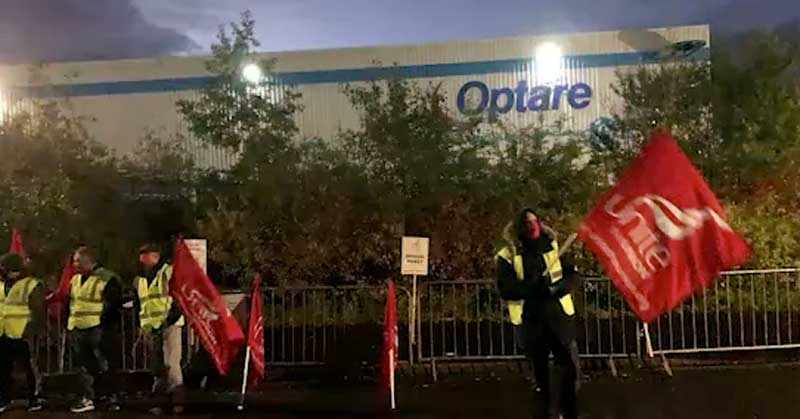

By Andy Yorke
Workers at the Optare bus manufacturer outside Leeds are on strike to secure a long-overdue pay rise. After a year of broken promises by the company, coronavirus is now adding more issues to their struggle.
Optare is Britain’s third largest bus builder, and owned by Ashok Leyland, one of the top four global bus manufacturers. Ashok Leyland is owned in turn by the Hinduja Group of the billionaire Hinduja brothers, who topped the UK rich list for the third time running in 2019. Worth £22 billion between them, they are holding out on a pay rise agreed for November 2019.
Pay claims
Optare bosses claim that having paid furlough money to workers it shouldn’t have to pay more, and other automotive manufacturers are cutting thousands of jobs. Demand for new buses has collapsed by 80 percent due to the corona crisis. According to industry website ITT, only 120 new buses were registered in the UK in the second quarter 2020, down from 582 in the same period last year. It claims that “forward orders are even worse” for the sector.
But the old argument “you’re lucky to have a job” rightly hasn’t washed with Optare workers, who had to strike in 2014 over penny pinching pay policies.
Unite the union states that its members are paid below the norm for their sector, and had deferred pay claims “on a number of occasions” at the company’s request before finally putting in for a rise. Months of being given the run around with negotiations put off and postponed have finally forced the workers to make a stand or watch their living standards decline.
As Unite regional officer Richard Bedford put it: “The decision to strike is never taken lightly, especially in the current climate, but our members have reached the end of their tether with Optare’s point blank refusal to honour its word. They are simply asking for a reasonable pay rise and have been pushed into taking this action because of Optare’s broken promises.”
Pickets and scabs
Over 100 members voted 73 percent in favour of strike action and action short of a strike. An overtime ban on 15 October kicked off four rounds of two day strikes. With two days on the picketline at the Sherburn in Elmet factory, they are preparing for a string of further two-day strikes into November (see below for details).
Despite workers showing further goodwill during the corona crisis, for instance working shifts to allow for social distancing, they report the company has failed to respond in kind. While staff were previously paid 33 percent extra for night shifts, they are now being paid 10 percent. Contractors brought in before the industrial action started mean the day shift is even busier than before – so much for distancing!
Picket lines have attracted enthusiastic support from workers. The company’s response has been to put on private security with bodycams to patrol outside and make sure the scabs – in crowded cars without any masks, another covid risk – can drive through the picket lines without a hitch.
In 2014, pickets were able to turn away supply drivers who refused to cross picket lines. Workers will no doubt be discussing the next steps on their pickets. If bosses don’t back down, they can escalate the action and call on the labour movement to deliver solidarity.
For a programme of public works to build the things we need
The bus sector like many has been hit by the covid-19 crisis. The solution is not for workers to agree to split the cost – and end up paying most or all of it – with pay givebacks, short time working or agreed redundancies. Companies that claim they are bankrupt, and make cuts or close workplaces should be nationalised without compensation, and put to work making the things we need.
Optare is at the forefront of developing a range of new electric buses, an important part in achieving a zero carbon Britain. The labour and environmental movements should join together in supporting the Optare workers and developing an emergency response to the covid crisis.
The answer is to make the bosses pay, not workers, and employ those without jobs on a living wage with a programme of public works, under workers’ control. The Tories will say there’s no magic money tree for that, and Keir Starmer’s Labour will ask how we can afford it. The answer is a massive corona levy on the likes of the Hinduja brothers and the rest of the rich list tycoons and dynasties, supported by a steeply progressive tax on personal wealth.
Victory to the Optare workers!
Solidarity with the picketlines:
Discontinuous strike action at Optare will take place on: